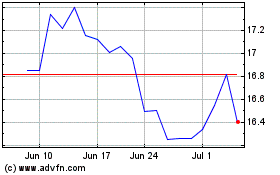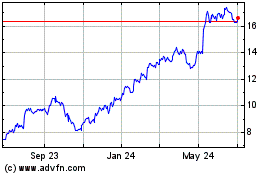Teva Pharmaceutical Industries Ltd. (NYSE and TASE: TEVA) today
announced the presentation of 12 posters at the upcoming 2017 Psych
Congress, September 16-19 in New Orleans, Louisiana. The clinical
and health economics data to be presented include additional
analyses from two pivotal Phase III trials, AIM-TD and ARM-TD, as
well as safety data evaluating AUSTEDO® (deutetrabenazine) tablets
in tardive dyskinesia (TD).
“Teva’s data at the 2017 Psych Congress shed light on the
importance of recognizing the day-to-day impact of living with
tardive dyskinesia,” said Michael Hayden, M.D., Ph.D., President of
Global R&D and Chief Scientific Officer at Teva. “We are
pleased to provide additional clinical context to the psychiatric
community to demonstrate the significance of treating this
population.”
The full set of Teva-sponsored data to be presented is included
below:
Title Authors
Date/Time Deutetrabenazine in Tardive Dyskinesia and
Huntington’s Disease
[Abstract 250] Effect
ofDeutetrabenazine on Quality ofLife in Patients With
TardiveDyskinesia in AIM-TD, a 12-Week Double-Blind,
Placebo-Controlled Study
S.A. Factor, DO; K.E. Anderson, MD;M.D.
Davis, PhD; R.A. Hauser, MD,MBA; L.F. Jarskog, MD; J.
Jimenez-Shahed, MD; R. Kumar, MD, FRCPC;S. Ochudlo, MD, PhD; W.G.
Ondo, MD;H.H. Fernandez, MD
Sunday, September 17 andMonday, September
18from 1:30-2:30 p.m. CT
All posters will also be presented during
the Poster Gala on Sunday, September 17 from 5:30-7:30 p.m. CT
[Abstract 232]Deutetrabenazine for
theTreatment of TardiveDyskinesia: Results From anOpen-Label,
Long-Term Study
K.E. Anderson, MD; M.D. Davis, PhD;S.A.
Factor, DO; R.A. Hauser, MD,MBA; L.F. Jarskog, MD; J.
Jimenez-Shahed, MD; R. Kumar, MD, FRCPC;S. Ochudlo, MD, PhD; W.G.
Ondo, MD;H.H. Fernandez, MD
[Abstract 233] Long-TermSafety of
Deutetrabenazine forthe Treatment of TardiveDyskinesia: Results
From anOpen-Label, Long-Term Study
K.E. Anderson, MD; M.D. Davis, PhD;S.A.
Factor, DO; R.A. Hauser, MD,MBA; L.F. Jarskog, MD; J.
Jimenez-Shahed, MD; R. Kumar, MD, FRCPC;S. Ochudlo, MD, PhD; W.G.
Ondo, MD;H.H. Fernandez, MD
[Abstract 238] Improvementsin
Clinical Global Impression ofChange With DeutetrabenazineTreatment
in TardiveDyskinesia From the ARM-TDand AIM-TD Studies
H.H. Fernandez, MD; M.D. Davis, PhD;S.A.
Factor, DO; R.A. Hauser, MD,MBA; L.F. Jarskog, MD; J.
Jimenez-Shahed, MD; R. Kumar, MD, FRCPC;S. Ochudlo, MD, PhD; W.G.
Ondo, MD;K.E. Anderson, MD
[Abstract 239] Evaluation
ofPatient-Reported Outcomes inTardive Dyskinesia PatientsWith
Underlying Psychotic andMood Disorders in the ARM-TDand AIM-TD
Trials
H.H. Fernandez, MD; M.D. Davis, PhD;S.A.
Factor, DO; R.A. Hauser, MD,MBA; L.F. Jarskog, MD; J.
Jimenez-Shahed, MD; R. Kumar, MD, FRCPC;S. Ochudlo, MD, PhD; W.G.
Ondo, MD;K.E. Anderson, MD
[Abstract 237] CardiovascularSafety
Assessment ofDeutetrabenazine in HealthyVolunteers and Implications
forPatients With HuntingtonDisease or Tardive Dyskinesia
D.S. Cox, PhD; M. Levi, PhD;
L.Rabinovich-Guilatt; D. Truong, PharmD,MS; D. Stamler, MD
Health Economics and Research Outcomes (HEOR)
[Abstract 236]
HealthcareUtilization and Costs forPatients With
TardiveDyskinesia
B. Carroll, PharmD; P. Juneau, MS;
D.Irwin, PhD, MSPH
Sunday, September 17 andMonday, September
18from 1:30-2:30 p.m. CT
All posters will also be presented during
the Poster Gala on Sunday, September 17 from 5:30-7:30 p.m. CT
[Abstract 255] The Burden ofTardive
Dyskinesia Secondaryto Antipsychotic Medication UseAmong Patients
With MentalDisorders
J. McEvoy, MD; T. Park, PharmD;
T.Schilling, MD; E. Terasawa, PhD; R.Ayyagari, PhD; B. Carroll,
PharmD
[Abstract 235] HospitalUtilization
Rates FollowingAntipsychotic Dose ReductionsAmong Patients With
Bipolarand Major DepressiveDisorders
B. Carroll, PharmD; F. Mu, PhD;
R.Ayyagari, PhD; S. Gandhi, PhD
[Abstract 234] HospitalUtilization
Rates FollowingAntipsychotic Dose ReductionsAmong Patients
WithSchizophrenia
S.N. Caroff, MD; F. Mu, PhD; R.Ayyagari,
PhD; T. Schilling, MD; V.Abler, DO; B. Carroll, PharmD
[Abstract 252] TardiveDyskinesia
Among PatientsUsing AntipsychoticMedications in CustomaryClinical
Care in the UnitedStates
A.M. Loughlin, PhD, N. Lin, ScD; V.Abler,
DO; B. Carroll, PharmD
[Abstract 256] Effect ofTardive
Dyskinesia on Qualityof Life: Self-reported SymptomSeverity is
Associated withDeficits in Physical, Mental, andSocial
Functioning
J. McEvoy, MD; B. Carroll, PharmD;
S.Gandhi, PhD; A. Rizio, PhD; S. Maher,PhD; M. Kosinski, MA; J.
Bjorner, MD,PhD
About AUSTEDO®
AUSTEDO® is a vesicular monoamine transporter 2 (VMAT2)
inhibitor approved by the U.S. Food and Drug Administration for the
treatment of tardive dyskinesia in adults and for the treatment of
chorea associated with Huntington’s disease.
Important Safety Information
AUSTEDO® can increase the risk of depression
and suicidal thoughts and behavior (suicidality) in patients with
Huntington’s disease. Anyone considering the use of
AUSTEDO® must balance the risks of depression and
suicidality with the clinical need for treatment of chorea.
AUSTEDO® is contraindicated in patients with
Huntington’s disease who are suicidal, or have untreated or
inadequately treated depression.
AUSTEDO® is also contraindicated in: patients with hepatic
impairment; patients taking reserpine or within 20 days of
discontinuing reserpine; patients taking monoamine oxidase
inhibitors (MAOIs), or within 14 days of discontinuing MAOI
therapy; and patients taking tetrabenazine (Xenazine) or
valbenazine (Ingrezza).
AUSTEDO® may cause a worsening in mood, cognition, rigidity, and
functional capacity in patients with Huntington’s disease.
Tetrabenazine (a closely related VMAT2 inhibitor) causes an
increase in the corrected QT (QTc) interval. A clinically relevant
QT prolongation may occur in some patients treated with AUSTEDO®
who are CYP2D6 poor metabolizers or are co-administered a strong
CYP2D6 inhibitor or other drugs that are known to prolong QTc.
Neuroleptic Malignant Syndrome has been observed in patients
receiving tetrabenazine. AUSTEDO® may increase the risk of
akathisia, agitation, and restlessness. AUSTEDO® may cause
parkinsonism in patients with Huntington’s disease. Sedation is a
common dose-limiting adverse reaction of AUSTEDO®.
The most common adverse reactions (4% of AUSTEDO®-treated
patients and greater than placebo) in controlled clinical studies
of patients with tardive dyskinesia were nasopharyngitis and
insomnia. The most common adverse reactions (>8% of
AUSTEDO®-treated patients and greater than placebo) in a controlled
clinical study of patients with chorea associated with Huntington’s
disease were somnolence, diarrhea, dry mouth, and fatigue.
Please click here for U.S. Full Prescribing Information,
including Boxed Warning: austedo.com/hcp/pi.
About Teva
Teva Pharmaceutical Industries Ltd. (NYSE and TASE: TEVA) is a
leading global pharmaceutical company that delivers high-quality,
patient-centric healthcare solutions used by approximately 200
million patients every day. Headquartered in Israel, Teva is the
world’s largest generic medicines producer, leveraging its
portfolio of more than 1,800 molecules to produce a wide range of
generic products in nearly every therapeutic area. In specialty
medicines, Teva has the world-leading treatment for multiple
sclerosis as well as late-stage development programs for other
disorders of the central nervous system, including movement
disorders, migraine, pain and neurodegenerative conditions, as well
as a broad portfolio of respiratory products. Teva is leveraging
its generics and specialty capabilities in order to seek new ways
of addressing unmet patient needs by combining drug development
with devices, services and technologies. Teva's net revenues in
2016 were $21.9 billion. For more information, visit
www.tevapharm.com.
Cautionary Note Regarding Forward-Looking Statements
This press release contains forward-looking statements within
the meaning of the Private Securities Litigation Reform Act of 1995
regarding AUSTEDO® (deutetrabenazine) tablets, which are based on
management’s current beliefs and expectations and are subject to
substantial risks and uncertainties, both known and unknown, that
could cause our future results, performance or achievements to
differ significantly from that expressed or implied by such
forward-looking statements. Important factors that could cause or
contribute to such differences include risks relating to:
- the uncertainty of commercial success
of AUSTEDO® (deutetrabenazine) tablets;
- our specialty medicines business,
including: competition for our specialty products, especially
COPAXONE®, our leading medicine, which faces competition from
existing and potential additional generic versions and
orally-administered alternatives; our ability to achieve expected
results from investments in our product pipeline; competition from
companies with greater resources and capabilities; and the
effectiveness of our patents and other measures to protect our
intellectual property rights;
- our business and operations in general,
including: our ability to develop and commercialize additional
pharmaceutical products; manufacturing or quality control problems,
which may damage our reputation for quality production and require
costly remediation; interruptions in our supply chain; disruptions
of our or third party information technology systems or breaches of
our data security; the restructuring of our manufacturing network,
including potential related labor unrest; the impact of continuing
consolidation of our distributors and customers; and variations in
patent laws that may adversely affect our ability to manufacture
our products;
- compliance, regulatory and litigation
matters, including: costs and delays resulting from the extensive
governmental regulation to which we are subject; the effects of
reforms in healthcare regulation and reductions in pharmaceutical
pricing, reimbursement and coverage; potential additional adverse
consequences following our resolution with the U.S. government of
our FCPA investigation; governmental investigations into sales and
marketing practices; potential liability for sales of generic
products prior to a final resolution of outstanding patent
litigation; product liability claims; increased government scrutiny
of our patent settlement agreements; failure to comply with
complex Medicare and Medicaid reporting and payment
obligations; and environmental risks;
and other factors discussed in our Annual Report on Form 20-F
for the year ended December 31, 2016 (“Annual Report”),
including in the section captioned “Risk Factors,” and in our other
filings with the U.S. Securities and Exchange Commission,
which are available at www.sec.gov and www.tevapharm.com.
Forward-looking statements speak only as of the date on which they
are made, and we assume no obligation to update or revise any
forward-looking statements or other information contained herein,
whether as a result of new information, future events or otherwise.
You are cautioned not to put undue reliance on these
forward-looking statements.
View source
version on businesswire.com: http://www.businesswire.com/news/home/20170914005520/en/
Teva Pharmaceutical Industries Ltd.IR
Contacts:United StatesKevin C.
Mannix, 215-591-8912Ran Meir, 215-591-3033IsraelTomer Amitai, 972 (3) 926-7656orPR
Contacts:IsraelIris Beck Codner,
972 (3) 926-7208United StatesDenise
Bradley, 215-591-8974
Teva Pharmaceutical Indu... (NYSE:TEVA)
Historical Stock Chart
From Mar 2024 to Apr 2024

Teva Pharmaceutical Indu... (NYSE:TEVA)
Historical Stock Chart
From Apr 2023 to Apr 2024
